- Home
- John Jakes
North and South Trilogy Page 6
North and South Trilogy Read online
Page 6
A drum rattled somewhere, the beats staccato, the pattern distinctive. Closer at hand, a cadet in a splendid uniform walked briskly toward them, bound for the hotel. George held up a hand to catch his attention.
“Excuse me.”
The cadet halted, standing rigid and fixing them with hard eyes “Did you address me, sir?” Rather than speaking, he bellowed.
George managed to keep smiling. “That’s right. We’re looking for the—”
“If you are a newcomer, sir,” the other screamed, “take off your hat, sir.” He whipped his eyes to Orry. “You also, sir. Always uncover when you address a superior, sir.” To George again. “Now, sir. What did you say to me, sir?”
Intimidated by the shouting and all the sirs, George barely managed to ask directions to the adjutant’s office.
“That way, sir. I will see you again, sir. Make no mistake about that, sir.”
He marched on. George and Orry exchanged dismayed looks. It was their first introduction to the West Point style of address. Neither young man liked it.
The adjutant’s clerk was another Irishman, but a genial one this time. He took their appointment papers. A second assistant relieved them of their pocket money and recorded the amount in a ledger. They were then directed to see Cadet Sergeant Stribling in room fourteen of South Barracks.
Near the barracks the two paused by the communal water pump and looked past Superintendent Delafield’s grazing cow to groups of young men drilling on the Plain. Orry and George knew they were newcomers because they still wore civilian clothes. The adjutant’s clerk had answered Orry’s question about uniforms:
“You don’t get one until you’re officially a plebe, m’lad. And you’re not a plebe until you pass the entrance examinations.”
The marchers on the field executed commands sloppily and stumbled often. This caused their cadet drillmasters to shout all the louder. Soon the newcomers were replaced by members of the cadet battalion, in uniform. Their drill was so smart and synchronized, Orry knew there was hope for the new arrivals.
They found Cadet Stribling turned out in immaculate white trousers and a cadet-gray jacket adorned with black cord herringbones and three rows of bullet-shaped gilt buttons. Stribling abused them verbally, just as the cadet near the hotel had done, then sent them to the post store where they drew supplies: bucket and broom, a tin dipper, a lump of soap, an arithmetic book and slate, and blankets. The blankets were so new they still reeked of sheep’s oil. It was the traditional smell of the plebe.
Their room on the third floor of South Barracks was hardly a haven for lovers of luxury: a single window, a few storage shelves, a huge chimney and fireplace dominating one wall. Orry wondered whether the room would hold heat on snowy winter nights. He had seen but one snowfall, and that had lasted just two hours on the ground, but this wasn’t South Carolina.
George studied the narrow iron beds with a professional eye. The legs were badly cast, he said. Another drum call, this one different from the first, drifted up to them in the sultry air. George made a face. “That drum seems to signal every activity around here. I feel like a damn slave to it already.”
“Do you suppose that’s the call to supper?” Orry said with a hopeful look.
“It better be. I’m starved.”
But it was not yet mealtime. Downstairs they were ordered to fall in to watch the evening parade. A cadet band struck up a march, and Orry quickly forgot his hunger.
Bayonets on shouldered muskets flashed in the orange light of the sinking sun. The colors and officers’ hat plumes danced in the breeze. The marching and the music thrilled Orry, and all at once he felt less homesick, almost happy to be here. West Point was, after all, a kind of fulfillment of a boyhood ambition that still dominated his life.
Orry couldn’t remember exactly when he had decided to become a soldier, but he was very much aware of why he thought so highly of the profession. It was glamorous—much more so than the life of a rice planter—and it was important in the universal scheme of things. Many people looked down on military men, yet no one could deny that generals and their armies frequently changed the shape of entire countries and altered the course of history.
Growing up, he had read book after book about commanders who had done just that. Alexander. Hannibal. Jenghiz Khan. Bonaparte, whose apocalyptic shadow had covered Europe less than half a century ago. Out of Orry’s reading and his boyhood dreams, which mingled danger and pageantry, nobility and bloodshed, had come his decision about his life’s work. He would be thankful forever that his older brother hadn’t wanted the appointment.
After the conclusion of the impressive evening ceremony the drum called them again—this time for supper. Cadet Stribling commanded the squad of newcomers who marched to the mess hall in slovenly fashion. In the hall everyone stood until the senior cadet captain gave the command to sit.
The squad was placed at a tottery wooden table reserved for newcomers. At other tables, however, Orry noticed new cadets seated with upperclassmen. He could only assume those things had arrived the day before, The first classmen had the best seats at the ends of the tables. Next along the sides came the second classmen, then the yearlings, then the plebes. Finally, at the very center of each side—farthest from the food—were the nervous newcomers Orry was observing. The upperclassmen passed snide comments about them but were slow to pass the bowls of food. Orry was thankful he wasn’t at that kind of table tonight.
Someone said the main meal of the day was midday dinner. Hence all they got for supper was standard Army leftovers—beef and boiled potatoes. George and Orry were hungry enough that it made no difference. Besides, there were some positively delicious extras: homemade bread, country butter, rich coffee.
At the conclusion of supper the cadet captain gave the order to rise. Cadets and newcomers marched back to barracks, with fifes supplementing the drum cadence. While George and Orry spread their blankets on their iron beds, George’s sullen look asked why they had come to this place of loneliness and regimentation.
Between all-in and tattoo, a couple of upperclassmen stopped by to introduce themselves. One, a six-footer named Barnard Bee, was a South Carolinian, which pleased Orry. George was greeted by a cadet from his home state, Winfield Hancock.
South Barracks housed most of the new arrivals, and that night George and Orry met some of them as well. One was a bright, glib little chap from Philadelphia who introduced himself as George McClellan.
“Real society stuff,” George noted after McClellan left. “Everybody in eastern Pennsylvania knows his family. They say he’s smart. Maybe a genius. He’s only fifteen.”
Orry left off examining his image in the small looking glass over the washstand; he had already been ordered to get a haircut.
“Fifteen? How can that be? You’re supposed to be sixteen to get in here.”
George gave him a cynical look. “Unless you have connections in Washington. My father says there’s a lot of political pull employed to get certain men admitted. And to keep ’em here if they can’t handle the work or get in a jam.”
Two more newcomers stopped in a few minutes later. One, an elegantly dressed Virginian named George Pickett, was of medium height, with a quick smile and dark, glossy hair that hung to his shoulders. Pickett said he had been appointed from the state of Illinois, where he had clerked in his uncle’s law office. There had been no Virginia appointments available to him. Pickett seemed even more contemptuous of the rules than the other George; his breezy manner was immediately likable.
The second visitor was also a Virginian, but Pickett’s enthusiasm seemed forced when he performed introductions. Perhaps Pickett had struck up an acquaintance with the tall, awkward fellow and now regretted it. There was a marked difference between George Pickett of Fauquier County and the new cadet from Clarksburg. Of course that far western section of the state could hardly be considered an authentic part of the South; it was mountainous and populated with a lot of illiterate rustics—
<
br /> Of which Tom J. Jackson, as he called himself, was a prime example. His skin was sallow; his long, thin nose looked like the blade of a knife. The intensity of his blue-gray eyes made Orry nervous. Jackson tried hard to be as jolly as Pickett, but his lack of social grace made the short visit uncomfortable for all four young men.
“With that phiz, he should be a preacher, not a soldier,” George said as he snuffed out the candle. “Looks to me like he’s worrying about something. A bellyache. Cramped bowels, maybe. Well, who cares? He won’t last ten days.”
Orry almost fell off the bed when someone kicked the door open and a stentorian voice exclaimed:
“And you, sir, will not last a fraction of that time if you don’t practice a seemly silence at the appropriate moments. Good night, sir!” The door shut, a thunderclap. Even at a time of rest there was no escaping the system—or the upperclassmen.
The drum called them before daylight. The morning that followed was strange and uneasy. A cadet lieutenant, a Kentuckian, threw all their blankets on the floor and lectured them on the correct way to fold bedding and put the room in shape for inspection. George seethed, but their treatment could have been worse. A newcomer in a nearby room was visited by two cadet noncoms, one of whom introduced the other as the post barber. The trusting newcomer surrendered himself to razor and shears. Next time he was seen, he was bald.
Not all the upperclassmen were dedicated to deviling the new arrivals; some offered help. Cadet Bee volunteered to tutor the roommates in any of the subjects on which they would have to recite during entrance examinations—reading, writing, orthography, simple proportions, decimals, and vulgar fractions.
George thanked Bee but said he thought he could get through all right. Orry gratefully accepted the offer. He had always been a wretched student, with a poor memory; he had no illusions about that.
George didn’t feel he had to study. He spent the morning asking questions of some of the less hostile upperclassmen. A couple of things that he discovered pleased him immensely.
He learned that a river man frequently rowed to a nook on the bank below the Plain and there awaited the cadets who had blankets or other contraband to trade. The river man’s illegal goods included cakes, pies, whiskey, and—blessed news—cigars. George had been smoking since he was fourteen.
Even more satisfying was the news that young female visitors came and went at Roe’s Hotel the year round. Women of all ages seemed to be smitten with a certain malady described with a leer and a wink as “cadet fever.” George’s four-year exile might not be as grim as he’d feared.
He knew he would find the discipline tiresome but the education offered by the Academy was supposedly very fine, so he would negotiate his way around the rules. His roommate was pleasant enough. Likable, even. Not nearly so clannish as some of the Southrons he observed. In less than twenty-four hours many of them, and many Yankees as well, had found their fellows and formed their own little groups.
After dinner the drum sounded drill call. George was momentarily content as he joined his squad in the street. The contentment departed when he saw the drillmaster—a plebe who would become a yearling as soon as the first class changed the gray for blue.
This fellow surely weighed more than two hundred pounds. The start of a paunch showed beneath his uniform. He had black hair, sly dark eyes, and a complexion that reddened rather than browned in the sunshine. He appeared to be eighteen or nineteen. George thought of him as a porker, a pachyderm, and disliked him on sight.
“I, gentlemen, am your drillmaster, Cadet Bent. Of the great and sovereign state of Ohio.” Bent unexpectedly stepped in front of Orry. “Do you have a comment on that, sir?”
Orry gulped. “No, I don’t.”
“You will reply with ‘No, I don’t—sir!’”
George had a sudden feeling that the fat cadet had taken time to discover where his charges had come from and was using the information to bait them. To many Southerners, the word Ohio meant just one thing—the state containing Oberlin College, where white and black students defied convention by studying together as equals.
“You gentlemen from down South fancy yourselves superior to we Westerners, do you not, sir?”
Orry’s neck reddened. “No, sir, we do not.”
“Well, I am pleased you agree with me, sir. Surprised but pleased.”
Bent strutted down the squad, passing a couple of obvious bumpkins and choosing George as his next victim. “And you, sir? How do you feel about the West vis-à-vis your section—the East, am I not correct, sir? Which of the three regions is in your view superior?”
George did his best to smile like a perfect idiot. “Why, the East, sir.”
“What did you say?”
Bent’s bad breath was sickening, but George kept smiling. “The East, sir. Nothing but farmers out West. Present company excepted, naturally, sir.”
“Would you make the same remark, sir, if you knew the Bent family had important and highly placed friends in Washington City, sir? Friends whose merest word could affect your standing here?”
Bloated braggart, George thought, grinning. “Yes, I would.” Before Bent could scream, he chirruped, “Sir.”
“Your name is Mr. Hazard, I believe, sir. Step forward! I shall use you to demonstrate one of the fundamental principles of marching to these gentlemen. Did you hear me, sir? I said step forward!”
George moved quickly. He had failed to heed the order because he’d been stunned by the spiteful light in Bent’s eyes. This was not mere deviling; the poor wretch drew pleasure from it. Despite the heat, George shivered.
“Now, sir, I shall demonstrate the principle of which I spoke. It is commonly termed the goose step. Stand on one leg, thus—”
He lifted his right leg but swayed; his weight unbalanced him.
“On the command front, the raised leg is flung forward, thus. Front!”
He couldn’t lift his leg very high because he was so heavy. Sweating, he held his position with difficulty. Then, shouting “Rear,” he tried to fling his leg downward and behind him. He nearly fell on his face. Someone snickered. With horror, George realized it came from the rank near Orry.
“You, sir. Our Southern hothouse lily. I believe you were making sport of me—of this military maneuver?”
“Sir,” Orry began, obviously startled.
“If you had been formally accepted as a plebe, sir, I would place you on report, and you would receive a score of demerits. You know, sir, that if you receive two hundred demerits in a year, you are sent down the Canterberry road”—that was the road to the nearest railroad depot and the familiar term for dismissal—“in disgrace. Even superior academics cannot save you. So curb your levity, sir.”
Awash in self-importance, Bent was enjoying himself. “And, more important, give heed to learning this maneuver. You shall practice it, sir—you and your roommate together. Step forward!”
George and Orry stood side by side. Bent strutted in front of them. In his fiercest hoping-for-corporal bellow, he cried, “On one leg, stand! Ready, begin! Front, rear. Front; rear. Front, rear.”
After a minute George felt pain in his right leg. He was damned if he’d let on. One of the regular officers strolled by, giving Bent an approving nod. Bent’s commands grew louder, the cadence faster. Sweat broke out all over George’s face. His leg began to throb, especially the thigh.
Two minutes passed. Two more. His ears rang, his eyes blurred. He figured he might last another ten minutes at most. He was in fine shape physically, but utterly unused to this wrenching exercise.
“Front, rear, front, rear!” Bent’s voice was husky with excitement.
Some others in the squad exchanged nervous looks. The fat cadet’s obsessive enjoyment was all too evident.
Orry fell first, pitching over and catching himself on palms and one knee. Bent stepped to him quickly, seeming to kick up some dust by accident. The dust struck Orry in the face.
Bent was about to order him to stand a
nd resume the exercise when he noticed that the officer was still watching.
“Back to the ranks, sir,” Bent said. He sounded almost regretful. He gave George a scathing look. “You too, sir. Perhaps next time you will not treat a military exercise so frivolously. Perhaps you will not be so pert with a superior.”
George’s right leg ached horribly. But he made it back to the squad, trying to limp as little as possible. Plebes had their generous share of miseries, he thought, but this spiteful hog, sweating his collar black—he was more than a disciplinarian. He was a sadist.
Bent’s sly little eyes sought his again. George returned the look with defiance. He knew he had made an enemy.
The two friends asked questions about Bent. They very quickly got more information than they expected. The Ohioan was a superior student but extremely unpopular. Members of his own class willingly discussed his failings—an unusual, even rare, disloyalty and an indication of Bent’s low status.
During Bent’s plebe year he had been subjected to an unusual amount of hazing. In the opinion of Hancock and others, he had brought it on himself with his pompous pronouncements about war and his frequent boasts about his family’s connections in Washington.
“I would surmise that he’s a boor because he’s fat,” Bee said. “I’ve known a couple of chubby fellows who were picked on when they were small and as a consequence grew up to be mighty rotten adults. On the other hand, that doesn’t explain why Bent’s so bloody-minded. His attitude goes way beyond the proper mental set of a soldier. Goes most all the way to queerness,” the South Carolinian finished with a tap of his forehead.
Another classmate mentioned Bent’s devotion to the Academy’s foremost professor, Dennis Mahan, who taught engineering and the science of war. Mahan believed the next great war, whatever its cause and whoever its participants, would be fought on new strategic principles.

 The Bastard
The Bastard The Furies
The Furies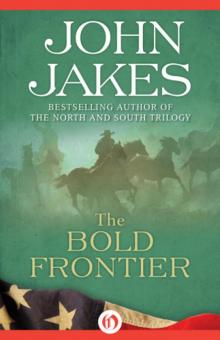 The Bold Frontier
The Bold Frontier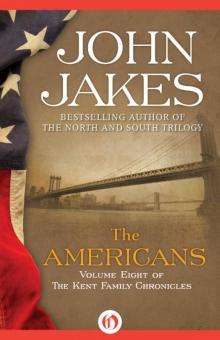 The Americans
The Americans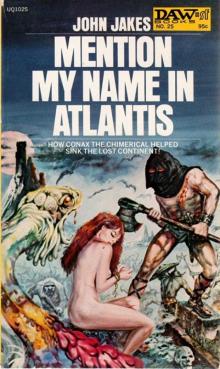 Mention My Name in Atlantis
Mention My Name in Atlantis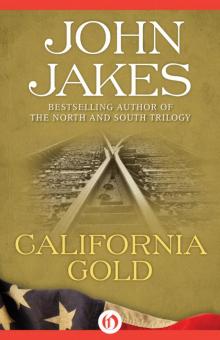 California Gold
California Gold North and South
North and South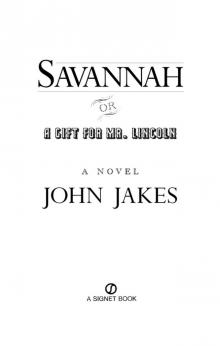 Savannah, or a Gift for Mr. Lincoln
Savannah, or a Gift for Mr. Lincoln Heaven and Hell
Heaven and Hell Homeland
Homeland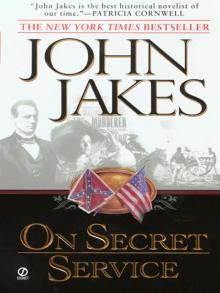 On Secret Service
On Secret Service The Lawless
The Lawless The Titans
The Titans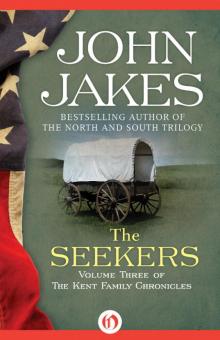 The Seekers
The Seekers Love and War
Love and War North and South: The North and South Trilogy (Book One)
North and South: The North and South Trilogy (Book One)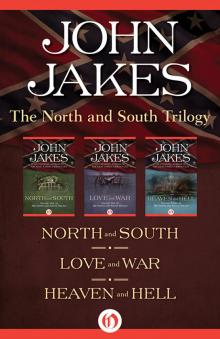 North and South Trilogy
North and South Trilogy Love and War: The North and South Trilogy
Love and War: The North and South Trilogy North and South: The North and South Trilogy
North and South: The North and South Trilogy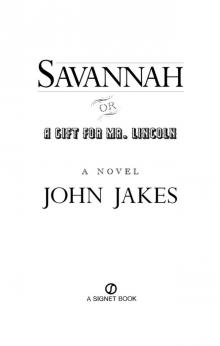 Savannah
Savannah Lawless
Lawless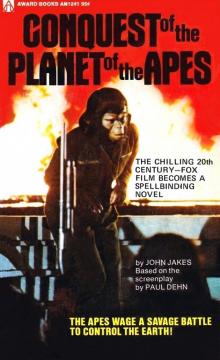 Conquest Of The Planet Of The Apes
Conquest Of The Planet Of The Apes Love and War: The North and South Trilogy (Book Two)
Love and War: The North and South Trilogy (Book Two) The Rebels: The Kent Family Chronicles
The Rebels: The Kent Family Chronicles Heaven and Hell: The North and South Trilogy
Heaven and Hell: The North and South Trilogy Planet of the Apes Omnibus 2
Planet of the Apes Omnibus 2 The Bastard: The Kent Family Chronicles
The Bastard: The Kent Family Chronicles Heaven and Hell: The North and South Trilogy (Book Three)
Heaven and Hell: The North and South Trilogy (Book Three)